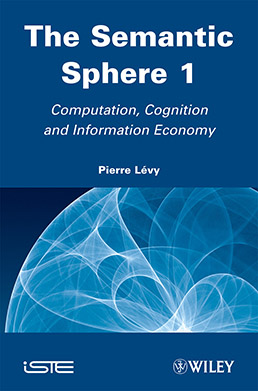
This book contains a philosophical justification and scientific explanation of a computable metalanguage called Information Economy Meta Language (IEML). This language is key to solving the semantic interoperability problem on the Web and to modeling future processes of collective intelligence online.
The new digital media offer us an unprecedented memory capacity, a ubiquitous communication channel and a growing computing power. How can we exploit this medium to augment our personal and social cognitive processes at the service of human development? Combining a deep knowledge of humanities and social sciences as well as a real familiarity with computer science issues, Pierre Lévy proposes, in this book, the collaborative construction of a global Hypercortex coordinated by a computable metalanguage. By recognizing fully the symbolic and social nature of human cognition, we could transform our current opaque global brain into a reflexive collective intelligence.
This book is the first to provide a practical scientific method to model social cognitive processes from the flows of on-line digital information. Using the IEML, the digital medium could be transformed into a hypercortex mirroring human collective intelligence. IEML allows a new kind of semantic computing that will revolutionize humanities, social sciences and the Internet as we know it.
1. General Introduction.
Part 1. The Philosophy of Information
2. The Nature of Information.
3. Symbolic Cognition.
4. Creative Conversation.
5. Toward an Epistemological Transformation of the Human Sciences.
6. The Information Economy.
Part 2. Modeling Cognition
7. Introduction to the Scientific Knowledge of the Mind.
8. The Computer Science Perspective: Toward a Reflexive Intelligence.
9. General Presentation of the IEML Semantic Sphere.
10. The IEML Metalanguage.
11. The IEML Semantic Machine.
12. The Hypercortex.
13. Hermeneutic Memory.
14. The Perspective of the Humanities: Toward Explicit Knowledge.
15. Observing Collective Intelligence.
Pierre Lévy was endowed with a Canada Research Chair in Collective Intelligence at the University of Ottawa in 2002. His CRC in Collective Intelligence was the first academic institution worldwide to be explicitly focused on this new scientific field. He is the author of 12 books about the cultural and social impacts of digital technologies that have been translated into more than 10 languages. He has received several scientific awards in France, Italy and Canada.